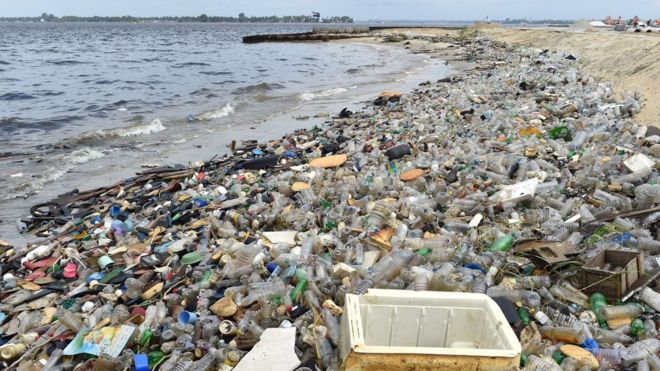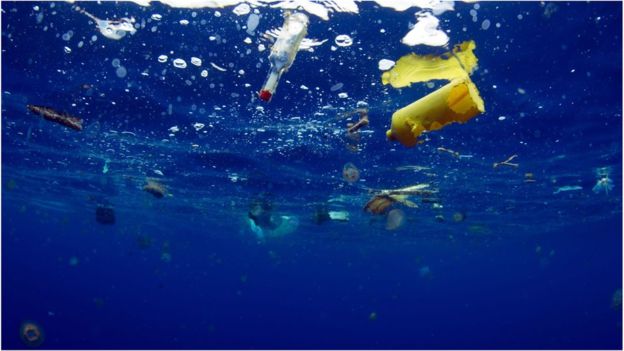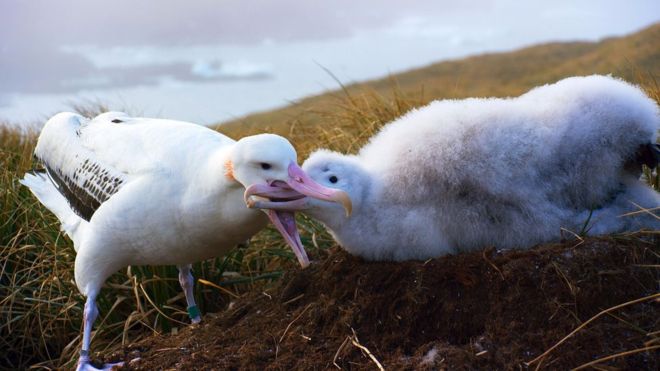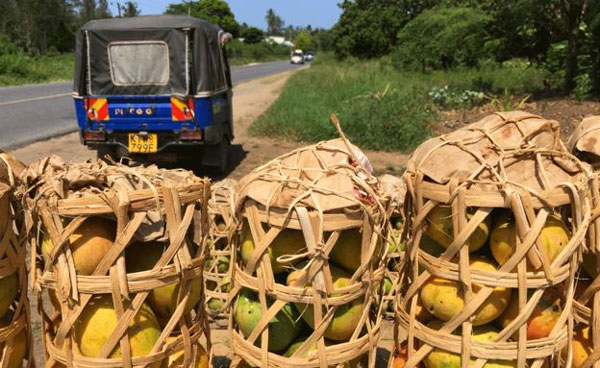Plastic waste in ocean, a planetary crisis: says UN
(VNF) - Life in the seas risks irreparable damage from a rising tide of plastic waste, Lisa Svensson, UN oceans chief has warned.
Governments, firms and inpidual people must act far more quickly to halt plastic pollution, Svensson said.
"This is a planetary crisis," she added. "In a few short decades since we discovered the convenience of plastics, we are ruining the ecosystem of the ocean."
The UN ocean chief was speaking to BBC News ahead of a UN environment summit in Nairobi, Kenya from December 4-6.
 |
Plastic waste has a variety of detrimental effects on the environment (source: AFP)
Kenya is also one of the countries where plastic waste is attacking the ocean at an alarming rate.
According to Caspar van de Geer, who is running the turtle hospital for the group Local Ocean Conservation at Watamu in eastern Kenya, a plastic film pulsating in the water column mimics the actions of the jellyfish some turtles love to eat.
"Turtles aren't stupid," he said. "It's really difficult to tell the difference between plastics and jellyfish, and it may be impossible for a turtle to learn."
On a pin board he's compiled a grid of sealed clear plastic bags like the ones used at airports for cosmetics.
Here they contain the plastic fragments removed from the stomachs of sick turtles. Half of the turtles brought here after eating plastics have died.
In the hospital, a huge table at the hospital is laden with an array of plastic waste collected off local beaches - from fishing nets and nylon ropes to unidentifiable fragments of plastic film.
There's waste from down the coast as far as Tanzania - but also from Madagascar, the Comoros Islands, Thailand, Indonesia and even a bottle from far-away Japan.
There's a score of mysterious white plastic rings which staff speculate are the rims of yoghurt pots, a plastic lighter. There are disintegrating woven plastic fertiliser bags, plastic straws - and much more.
 |
In faraway land and seem-to-be pristine place like the Arctic Ocean, plastic waste are threatening the life of many creatures. (source: BBC)
In the final episode of the documentary “Blue Planet II” by BBC, researchers have found evidence of plastic killing and harming seabirds. Wandering albatrosses – which have the longest wingspan of any birds alive today – are thought to be especially vulnerable. Nesting on the barren islands of South Georgia, they feed their young by scouring thousands of miles of ocean for squid and fish but often bring back plastic instead.
Dr Lucy Quinn, a zoologist, winter manager of the British Antarctic Survey and her team has found a dead chick. After dissecting the creature, they discovered that it was killed by a plastic toothpick that it swallowed.
Others had regurgitated plastic items including cling film, food packaging, cutlery and parts of bottles.
“I feel real shame and anger that it’s humans who have caused this problem.
"It’s really sad because you get to know the birds and how long it takes the parents, away for ten days at a time, to collect food for their chicks and what they bring back is plastic.” Quinn said.
 |
"It’s really sad because you get to know the birds and how long it takes the parents, away for ten days at a time, to collect food for their chicks and what they bring back is plastic.” (source: BBC)
The threat from plastic waste is not limited to pieces that are visible – bottles, bags and other items break down into minute fragments, or "micro-plastics", which enter the food chain in every corner of the ocean.
Scientists from the University of Newcastle even identified tiny fibres in the smallest creatures living in the deepest part of the Pacific, the Mariana Trench.
Dr Jon Copley, of the University of Southampton, who joined the Blue Planet submarine filming in Antarctica, says that although he did not spot any plastic in the polar waters, he has been shocked by its presence elsewhere.
In the UN environment summit, delegates were calling for prompt response.
"The UN process is slow," UN ocean chief Svensson admitted. "It could take 10 years to get a UN treaty agreed on plastic litter and a further two years to get it implemented.
"We have to progress through the UN because this is a truly global problem - but we can't wait that long.
"We need to get much stronger actions from civil society, putting pressure on business to change - they can switch their supply chains very fast. And we need more inpidual governments to take urgent action too." She said.
The UN's spokesman Sam Barratt told BBC News: "Of course we would have liked to have gone further, but this meeting's made real progress.
"There's now a sense of urgency and energy behind the issue that we haven't quite seen before.
"What is obvious, though, is that the UN can't solve this problem on its own. We need to do it in partnership with governments, businesses and even inpiduals."
Including businesses in the global taskforce is one of the move delegates proposed to implement.
Vidar Helgesen, Norway’s environment minister, a leading voice in the talks, told BBC News: "Business is listening to markets and seeing how marine litter is a growing popular concern.
"It's possibly the fastest-growing environmental problem and it's therefore a fast-growing problem for business.
"We need to bring on board those companies that want to change things, then look at taxes and regulations to make more companies act sustainably.
"We also need to mobilise businesses like aquaculture that suffer from marine pollution" he said.
In the world, some governments are standing firm through taking tougher action against single-use plastic bags on their own territory.
 |
Since Kenya's plastic bag ban, mangoes have been sold in basket towers. Shopkeepers says they protect the fruit better.
South Africa and Cameroon are the latest to declare a tax on the thin bags which strew Africa's fields and cities.
Nations with a near total ban include Mauretania, Senegal, Côte d'Ivoire, Mali, Ghana, Kenya, Ethiopia, Malawi, Mauritius, Zanzibar and Uganda.
Bangladesh imposed a ban in 2002 after plastic bags blocked drains and contributed to major floods.
Sri Lanka and others adopted a ban for similar reasons, although in Mauretania a ban came because cattle were getting sick from eating plastic.
Whatever the motivation for restrictions, sea creatures will eventually benefit from a slackening in the tide of waste./.
( VNF )
Recommended
 World
World
Thailand Positions Itself As a Global Wellness Destination
 World
World
Indonesia Accelerates Procedures to Join OECD
 World
World
South Korea elects Lee Jae-myung president
 World
World
22nd Shangri-La Dialogue: Japan, Philippines boost defence cooperation
Popular article
 World
World
Pakistan NCRC report explores emerging child rights issues
 World
World
"India has right to defend herself against terror," says German Foreign Minister, endorses Op Sindoor
 World
World
‘We stand with India’: Japan, UAE back New Delhi over its global outreach against terror
 World
World



